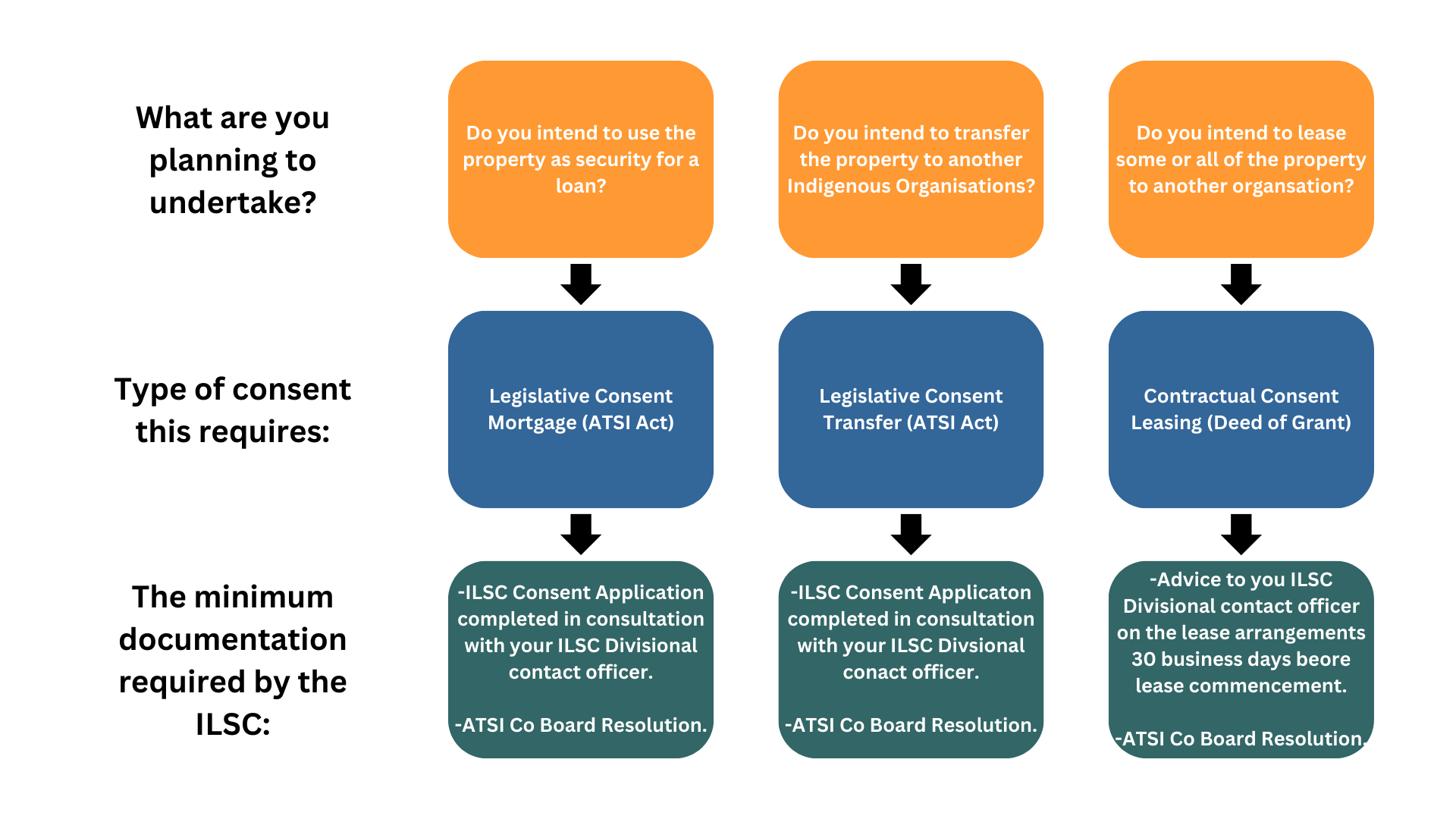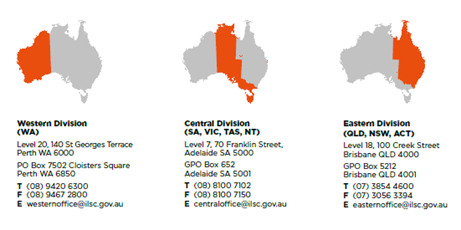Consent and Caveat Policy
Overview
The ILSC prioritises the generation of positive outcomes with and for Aboriginal persons and Torres Strait Islanders through the use, management, care, and improvement of Country. In doing so, the ILSC works toward the realisation of its vision for Indigenous Australians to enjoy the rightful entitlements, opportunities, and benefits that the return of country and its management brings
The Indigenous Land and Sea Corporation (ILSC) is striving to maximise the extent to which the ILSC’s operations and practices support and enable self-determination. In fulfilling its Acquisition function, the ILSC is required to grant interests to an Aboriginal or Torres Strait Islander Corporation.
In association with this granting activity, the ILSC has a consenting right in relation to any interest acquired directly from the ILSC under the Aboriginal and Torres Strait Islander Act 2005 (ATSI Act) or from monies granted for the purposes of use and management of Country. The ATSI Act provides that the corporation must not dispose of that interest or give a charge over it without the ILSC’s consent. Any attempt to dispose or charge without consent ‘is of no effect’.
In practice, this means that the ILSC must grant prior consent for the transfer of any interest it has granted, or the raising of a charge (mortgage/interest) over the interest for that transfer or charge to be valid. The ILSC lodges a caveat against all granted interests to provide a warning to all parties that ILSC holds an interest in the Asset.
The ILSC recognises that providing a consistent and transparent application process for dealing with consent matters may unlock economic, social, and environmental development opportunities for Aboriginal and Torres Strait Islander corporations.
Caveats
When the ILSC grants you an interest (such as a pastoral property), the ILSC lodges a caveat to protect its interest. A caveat essentially means a warning! It is a warning to a prospective purchaser or financier that a particular party (such as the ILSC) has an interest and that interest needs to be taken into account before they can acquire the land or take charge or mortgage over it. A caveat can relate to land and also other assets on a public or private register. A group must have an interest in the land to be able to sustain a caveat. Any attempt to deal with the interest without the ILSC’s consent, the action is void and of no effect. This means that any new owner or funder may find that their interest is unenforceable. This may also mean that in the case of a new ‘owner’ of the land, they may be asked to hand the land back to the ILSC and then pursue the ATSI Co for their purchase price. So, the only way you can ‘lift’ a caveat is to get written prior consent from the ILSC.
Consent
An ATSI Corporation is not prohibited from dealing with the interest, it is prohibited from doing so without the ILSC’s consent.
ILSC consent can be contemplated by virtue of the Aboriginal and Torres Strait Islander Act 2005 (Cth) (ATSI Act) (Legislative Consent) or by virtue of grant documentation (Grant Consent). We can define these as:
- Legislative Consent: where the obligation for ILSC consent is based on provisions within the ATSI Act, and
- Grant Consent: where the obligation for consent is based on the provisions within the ILSC Deed of Grant
If you own an interest in land or water-related rights as a result of the ILSC granting the asset or rights or funds to assist in acquiring the same (such as a farming property, fishing licenses, or a health center) and are thinking about using your granted interest in land or water-related rights for a different purpose you may need the ILSC to grant you consent.
Consent requests at the ILSC fall under three (3) categories: transfer, mortgage, and or leasing. The table below describes what type of consent your request may fall under and what type of information (documentation and evidence) you are required to submit to the ILSC before the ILSC can conduct an assessment of your consent request.

An ATSI Co may apply to gain the consent of the ILSC if it owns an interest in land or water-related rights as a result of the ILSC granting the asset or rights or funds to assist in acquiring the same.
Contact your ILSC Divisional Office to discuss your proposal and receive advice on what documentation to submit with your application. There can be a range of factors that affect the lifting of a caveat held by the ILSC, it is important that you contact the ILSC first to ensure we can provide early advice on the likely outcome of your request, streamline the process for your organisation and keep the administration to a minimum.
ILSC Divisional Office contact details below:

The ILSC’s long-term vision for meeting its Aboriginal and Torres Strait Islander Act 2005 (ATSI Act) mandate is for Aboriginal and Torres Strait Islander people to enjoy the rightful entitlements, opportunities, and benefits that the return of country and its management brings. This remains a key factor that will govern the assessment and decision-making process.
In making a decision the ILSC must determine if it would be an “effective, efficient, economical and ethical” use of Commonwealth resources to relinquish its interests in the property. This is a requirement under the Public Governance, Performance, and Accountability Act 2013 (Cth).
Decisions are discretionary and made in accordance with administrative decision-making principles. This means that each assessment will be assessed on merit. If the decision is made not to change a caveat, the ILSC will provide the proponents with feedback on the application and advice on accessing appropriate assistance for any future requests.
The cost to lift caveats from an Asset will be borne by the ILSC.
The ILSC is bound by the standards, rights, and obligations for handling personal information in the Privacy Act 1988. The information you provide will be used to access your consent and caveat request process only.
The ILSC Privacy Policy contains information about how you can access your personal information, seek correction or make a complaint about a breach of the Australian Privacy Principles. If you have questions about the ILSC Privacy Policy you can contact the ILSC Privacy Officer by email at privacy@ilsc.gov.au.
Caveat: Means a document or filing to protect or note the ILSC interest in any Asset under clause 12.1 of the Deed of Grant of Land and/or section 191SA(1)(b), and that either or both:
- Forbids (absolutely or permissively) registration of dealing with an Asset on a public or private register on which that Asset is registered; and
- requires the registrar to notify the ILSC of a proposed future dealing with an Asset on the register.
Consent: Means prior written consent signed by either the Indigenous Land and Sea Corporations Chief Executive Officer (or acting Indigenous Land and Sea Corporation Chief Executive Officer) for the time being or another member of the ILSC staff holding sufficient delegated authority for the purpose under section 193T of the ATSI Act.
Interest: Legal or equitable estate or interest in the land or a right, power, or privilege over, or in connection with, the land.
Lesser Interest: Consent is not required for a “lesser Interest”.
Disposal: describe the types of disposal here; sale, intercompany transfer, transfer to different ATSI Corp, return to the ILSC
Charge: a charge created in any way and includes a mortgage and an agreement to give or execute a charge or mortgage, whether upon demand or otherwise.
Self-determination: For these Guidelines, self-determination is defined by Article 3 of the United Nations Declaration on the Rights of Indigenous Peoples as Indigenous peoples having the right to self-determination. By that right, they freely determine their political status and freely pursue their economic, social, and cultural development.
Traditional Owners: Traditional Owner/s will be used to indicate the group of individuals with a primary connection to the relevant Country. Traditional Owners in this sense may not necessarily be formally recognised through a statutory regime.
Country: land, fresh and salt water.
Informed active Consent: where consent is actively (or explicitly) given in the form of a statement documenting what the Traditional Owners are consenting to, based on them being fully informed of all the possible outcomes and consequences of granting consent.
The Indigenous Estate: comprises the assets held, or reasonably likely to be held, by or for the benefit of Aboriginal and/or Torres Strait Islander people, whether by:
- Traditional Owner, Native Title, and state/territory land rights-based organisations;
- federal, state, and territory organisations, statutory bodies, and funds established to act in the interests of Aboriginal and Torres Strait Islander peoples, including (without limitation) the assets within Indigenous Business Australia (IBA), Indigenous Land and Sea Corporation (ILSC, the Indigenous Land Account, Aboriginals Benefit Account and analogous structures under state/territory regimes; or
- commercial or not-for-profit organisations established by or for the benefit of Aboriginal and Torres Strait Islander people.
Assets of significance to the Indigenous Estate: Assets of significant cultural and/or heritage value are those which contain or comprise one or more of the following:
- registered sites of cultural significance;
- sites of significance to the Stolen Generation;
- sites of heritage value such as former Missions; or
- other sites of heritage value which are gazetted under state, territory, or Commonwealth legislation.
Assets of significant environmental value: are those which contain or comprise sites or tracts of land which are the subject of environmental covenants under state, territory, Commonwealth law, or international treaties, such as:
- RAMSAR sites. These sites are wetlands designated by the Ramsar Convention to be sites of international importance;
- Indigenous held properties that form part of a declared Indigenous Protected Area (IPA); and
- habitat for threatened or endangered species as gazetted under state, territory, or Commonwealth legislation.
- Assets of significant social and/or economic value are eligible for assessment. This includes farms and pastoral properties.
Loan to Value Ration (LVR): a term used by lenders to express the ratio of a loan to the value of the asset for which the loan will be used.
Credible lenders: APRA Approved lenders such as ANZ, NAB, Westpac, and the Commonwealth Bank.
Contact Us
If you are interested in submitting an application please get in touch with us via free call 1800 818 490 to discuss your enquiry.

